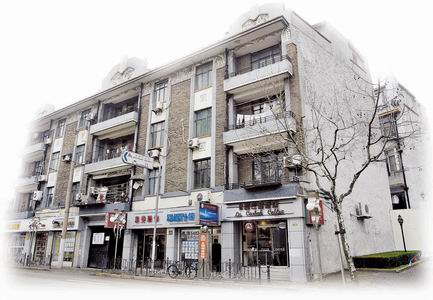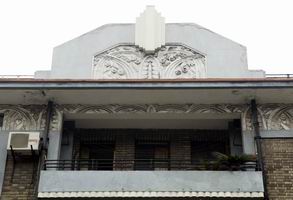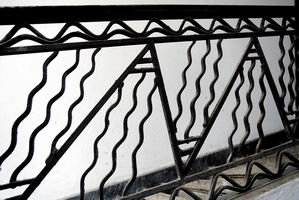Shanghai Daily news



The former Lincoln Apartments(top) on Huaihai Road,
built in 1931, retains its original "sort of localized art deco" style such as
the roof-top stone carvings(above left) and staircase railing(above
right).(Photo: Shanghai Daily)
The former Lincoln Apartments on Huaihai Road was where a wartime Chinese
quisling conducted a famous clandestine love affair with a Peking Opera star,
writes Michelle Qiao.
After Liberation in 1949, the Lincoln Apartments at 1554-1568 Huaihai Road
became the Shuguang (``Morning Twilight'') Apartments and it was there that a
treacherous local politician saw the beginning of the twilight of his long and
shameful career. Zhou Fohai had been a central figure in the Japanese puppet
regime that ruled occupied China during the War of Resistance against Japan
(1937-45) ``serving'' as police minister, treasurer and mayor of Shanghai.
For some time in that period, Zhou used one of the apartments in the building
as a love nest where he kept his mistress, the actress-singer, Xiao Linghong.
The elegant, low-key, four-story apartment block, constructed in 1931, is built
with light, coffee-colored bricks and has no bold colors or novel design
features. Only some light-gray, belt-shaped ornamentations embellish the windows
and terraces.
``Its style is a sort of localized art deco,'' says Liu Gang, an expert of
architectural history at Tongji University. ``I've been in one of the apartments
that faces south and it looks more practical than stylish. All the space is used
in a smart, economical way. The rooms are all spacious with separate bathroom
and kitchen.'' The first floor of the apartment block, covering 1,332 square
meters, is now a line of small cafes and mini stores. The floors above are
residential. Today, it's hard to imagine the scene more than 60 years ago when
Zhou and his mistress Xiao were conducting their affair there. Born in Hunan
Province in 1897, Zhou chose a political career after studying in Japan and is
renowned in Chinese history for his changeable character.
He attended the first conference of Communist Party of China in July 1921 but
quit the Party in 1924 to join the Kuomintang and his political career began to
soar while he was assigned to the publicity department of the then central
government. In 1938, he became a close collaborator of Wang Jingwei (Wang
Ching-wei), the man who was the premier of the puppet government in
Japanese-occupied China from 1940 to 1944. ``His (Zhou's) power in the regime
was amazing and it ran across finance, treasury, foreign affairs and part of the
army,'' wrote Jin Xiongbai in his book
``The Beginning and End of Wang Jingwei's Puppet Government'' published in
Hong Kong in 1965. Jin had also been a close friend and colleague of Zhou in the
puppet government. Like many men with wealth and power, Zhou had two hobbies --
wine and women. He had many lovers while married to his tough wife, Yang Shuhui,
but it was said that he did not truly fall in love until he saw Peking Opera
actress and singer Xiao.
They met one night when she was giving a private performance in the home of a
friend on Yuyuan Road. Zhou fell in love with Xiao that night and soon they
began meeting in the Xiangshan Road home of Pan Lingjiu who was a mistress of
Zhou's banker friend, Sun Yaodong. Several months later, Zhou rented an
apartment in the Lincoln Apartments and set it up as a love nest for himself and
Xiao. When Yang found out about the affair she threatened Zhou with divorce but
Zhou refused to leave Xiao. ``Xiao looked younger than 20 -- sweet, white and
plump,'' Jin wrote in his book.
Jin once represented Zhou's wife in negotiations with Xiao. ``She (Xiao) was
not pretty but very charming. I noticed that she was sympathetically shivering
during our conversation,'' he recalled. Zhou later pretended to abandon Xiao but
instead hid her in the home of a Japanese friend who put a telephone in Xiao's
bedroom where Zhou could receive his wife's check-up calls. Zhou and Xiao later
had a daughter.
``Zhou once told me that morally and emotionally he could not leave his wife
who had married him when he was a poor student,'' Jin wrote in his book. ``But
he truly loved Xiao and their affair was different from the others in his life.
No matter what troubles he had in his life, he would forget immediately when he
was with her. And since he was already middle-aged, he thought this might be the
last affair in his life.''
And, indeed, it was the last. After the invading Japanese were defeated in
1945, Zhou was captured and taken to Chongqing where he remained in custody for
nearly a year. He was then sent to Nanjing in Jiangsu Province where he stood
trial for his wartime role supporting the Japanese. He was sentenced to death
but this was commuted to life imprisonment by Chiang Kai-shek, the former leader
of the Kuomintang, after Zhou's wife had interceded for him. It seems that a
lifetime of wine and women had destroyed Zhou physically. He suffered from heart
and stomach problems while in prison and died a painful death on February 28,
1948, aged 52.
His wife buried him in an expensive nanmu coffin in the suburbs of Nanjing.
In his book, Jin wrote that Xiao stopped acting after Zhou was sent to prison.
They wrote to one another frequently and after Zhou's death, Xiao announced that
she would remain chaste and devote her life to bringing up their daughter.
However, some say she was forced to return to the stage after 1949 to make a
living.
The story of Zhou and his beloved mistress certainly adds some bold colors to
the rather plain-looking apartment block still standing on Huaihai Road.



